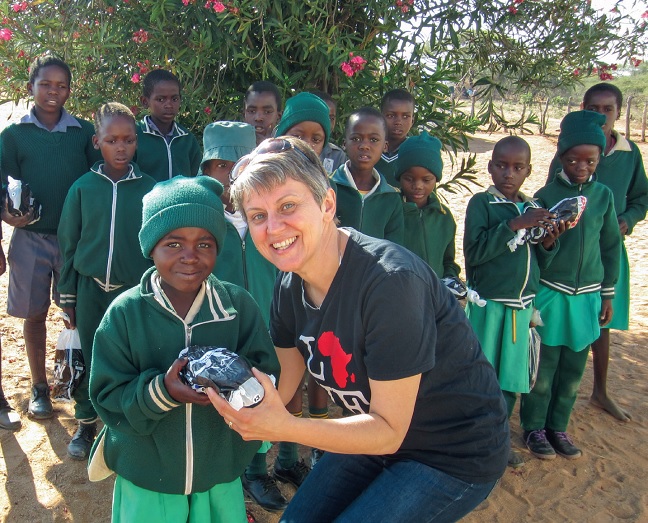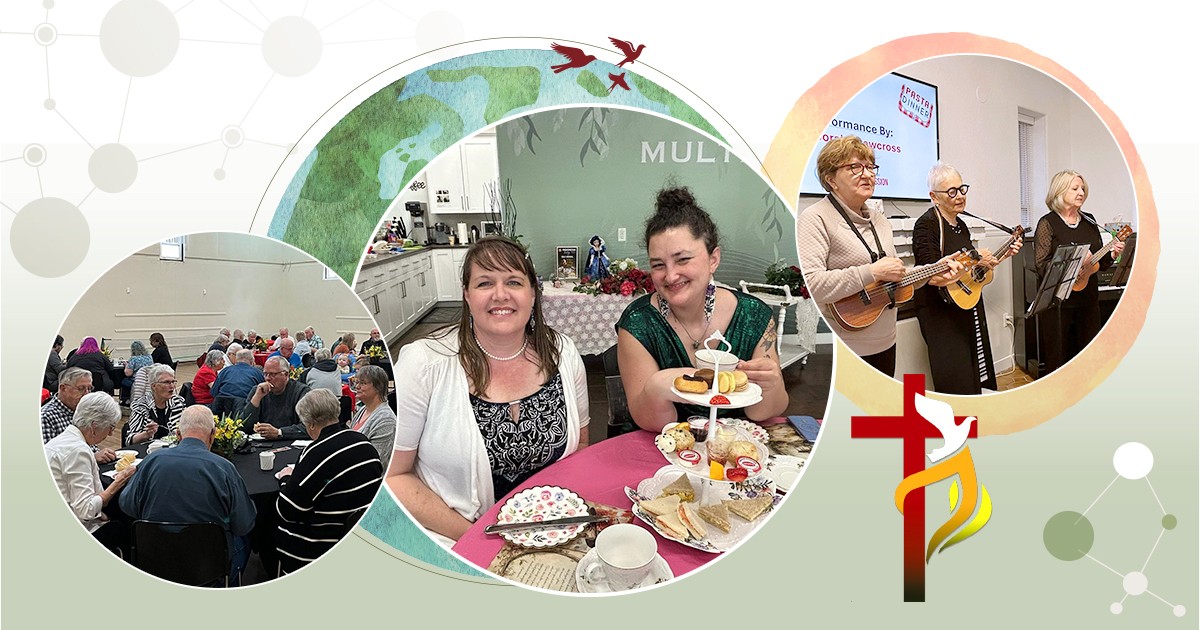How well I remember participating in the 13-week Self-Denial Appeal in Sunday school when I was a child. I must confess that my recollection of this annual project is somewhat shaded by how eager we were to get our yellow, red and blue buttons, to prove that we had contributed certain amounts to the cause. While my young heart may have been prone to the sin of pride (I admit to having a competitive streak), there was value in teaching us to consider the needs of others by denying ourselves a portion of our own blessings.
To contribute tangibly to reducing global disparity is a reflection of the nature of Jesus. Jesus said: “Whoever wants to be my disciple must deny themselves” (Luke 9:23). Since spiritual disciplines are designed as “the true path to spiritual growth,” as Richard Foster writes in Celebration of Discipline, self-denial is a Christian practice we should embrace.
This past summer, I was privileged to spend two-and-a-half weeks in the rural village of Tshelanyemba in southern Zimbabwe as part of the Silokwethemba project. (Silokwethemba means “we have hope.”) I saw first-hand how people strive to provide for their families in difficult conditions. Many families in this village live in small homes without electricity or running water. They walk long distances for firewood to cook their food and must carry pails of water for drinking, cleaning and doing laundry.
I saw many families caring for grandchildren or nieces and nephews because young parents had died of HIV-AIDS. When we visited schools, the headmasters shared story after story of families so affected by drought that they could barely eat, let alone pay school fees.
I found it hard to reconcile their lives with mine. My heart was deeply troubled with the reality of an unequal world. But then I remembered that we can make a difference when we deny ourselves to help our neighbour. We don't need yellow, red and blue buttons. We can be partners in mission by making small changes.
For example, my husband and I decided to change the way we give Christmas gifts by increasing donations to mission projects. All of us can honour God by refusing to be consumed with the excess of materialism and releasing our hold on our financial resources. As we do so, we reflect our Creator's likeness, for “from your bounty, God, you provided for the poor” (Psalm 68:10).
Are there other ways we can embrace the spiritual discipline of self-denial in a way that honours God, shapes more of his likeness in our lives and contributes to the needs of others? Here are some suggestions:
Make self-denial an individual decision. Consider one thing each week or month that you can give up to contribute to someone else's well-being. It could be coffee, new clothes, technology or movies. Set the example for people around you.
Make self-denial a family decision. Take your family on a tour of your home and make an inventory of what is essential and what is excessive in each room. Consider what could be sold in a yard sale or online to raise funds for Partners in Mission. Start learning to “live simply so others can simply live.”
Make self-denial part of your church mission. Ask each group in your church (youth, music, men, women, Bible studies, etc.) to create a strategy, with specific action plans, for living out Jesus' command for the body of Christ to model the spiritual discipline of self-denial.
Let's not forget that while believers and unbelievers alike may follow this life principle, believers in Christ should lead the way. Start small. Be accountable. Resist the current culture of consumerism. Grow in Christ and make a difference.
For Further Reading:
Major Wanda Vincent is the divisional director of women's ministries and the divisional secretary for spiritual life development in the Ontario Great Lakes Division.
To contribute tangibly to reducing global disparity is a reflection of the nature of Jesus. Jesus said: “Whoever wants to be my disciple must deny themselves” (Luke 9:23). Since spiritual disciplines are designed as “the true path to spiritual growth,” as Richard Foster writes in Celebration of Discipline, self-denial is a Christian practice we should embrace.
This past summer, I was privileged to spend two-and-a-half weeks in the rural village of Tshelanyemba in southern Zimbabwe as part of the Silokwethemba project. (Silokwethemba means “we have hope.”) I saw first-hand how people strive to provide for their families in difficult conditions. Many families in this village live in small homes without electricity or running water. They walk long distances for firewood to cook their food and must carry pails of water for drinking, cleaning and doing laundry.
I saw many families caring for grandchildren or nieces and nephews because young parents had died of HIV-AIDS. When we visited schools, the headmasters shared story after story of families so affected by drought that they could barely eat, let alone pay school fees.
I found it hard to reconcile their lives with mine. My heart was deeply troubled with the reality of an unequal world. But then I remembered that we can make a difference when we deny ourselves to help our neighbour. We don't need yellow, red and blue buttons. We can be partners in mission by making small changes.
For example, my husband and I decided to change the way we give Christmas gifts by increasing donations to mission projects. All of us can honour God by refusing to be consumed with the excess of materialism and releasing our hold on our financial resources. As we do so, we reflect our Creator's likeness, for “from your bounty, God, you provided for the poor” (Psalm 68:10).
Are there other ways we can embrace the spiritual discipline of self-denial in a way that honours God, shapes more of his likeness in our lives and contributes to the needs of others? Here are some suggestions:
Make self-denial an individual decision. Consider one thing each week or month that you can give up to contribute to someone else's well-being. It could be coffee, new clothes, technology or movies. Set the example for people around you.
Make self-denial a family decision. Take your family on a tour of your home and make an inventory of what is essential and what is excessive in each room. Consider what could be sold in a yard sale or online to raise funds for Partners in Mission. Start learning to “live simply so others can simply live.”
Make self-denial part of your church mission. Ask each group in your church (youth, music, men, women, Bible studies, etc.) to create a strategy, with specific action plans, for living out Jesus' command for the body of Christ to model the spiritual discipline of self-denial.
Let's not forget that while believers and unbelievers alike may follow this life principle, believers in Christ should lead the way. Start small. Be accountable. Resist the current culture of consumerism. Grow in Christ and make a difference.
For Further Reading:
- When Justice is the Measure, by M. Christine MacMillan, Don Posterski and James E. Read
- 7: An Experimental Mutiny Against Excess, by Jen Hatmaker
Major Wanda Vincent is the divisional director of women's ministries and the divisional secretary for spiritual life development in the Ontario Great Lakes Division.










Leave a Comment